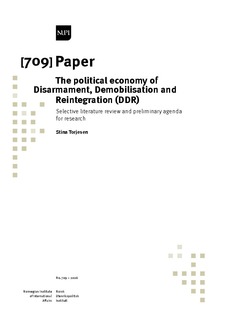| dc.contributor.author | Torjesen, Stina | |
| dc.date.accessioned | 2016-07-01T15:16:23Z | |
| dc.date.accessioned | 2016-07-13T08:11:13Z | |
| dc.date.available | 2016-07-01T15:16:23Z | |
| dc.date.available | 2016-07-13T08:11:13Z | |
| dc.date.issued | 2006 | |
| dc.identifier.citation | Working Paper, NUPI. 19 p. NUPI, 2006 | |
| dc.identifier.isbn | 82 7002 142 3 | |
| dc.identifier.uri | http://hdl.handle.net/11250/2396387 | |
| dc.description | - | |
| dc.description.abstract | Selective literature review and preliminary agenda
for research: Recent insights on war economies have important implications for disarmament, demobilisation
and reintegration (DDR). This paper identifies an underlying dilemma of DDR: on the one hand,
in order to convince warring factions to commit to peace, DDR strategies will have to offer significant
incentives that in turn may entrench the factions’ economic and political standing. On the other hand,
offering the armed factions important peacetime roles may jeopardise post-war economic reconstruction,
perpetuate cycles of underdevelopment and risk entrenching instability. It is argued in the paper
that while more insights are needed on how DDR can be improved, it is equally important to go one
step further and identify the positive as well as negative consequences for the economy, the market and
the state when attempts at comprehensive disarmament and reintegration of combatants are undertaken.
The paper discusses key findings from the literature on political economy of armed conflict and suggests
possible directions for new research. | |
| dc.language.iso | eng | |
| dc.title | The political economy of Disarmament, Demobilisation and Reintegration (DDR) | |
| dc.type | Research report | |
| dc.date.updated | 2016-07-01T15:16:23Z | |
| dc.identifier.cristin | 1365741 | |
| dc.subject.keyword | Internasjonal økonomi / International economics | |
